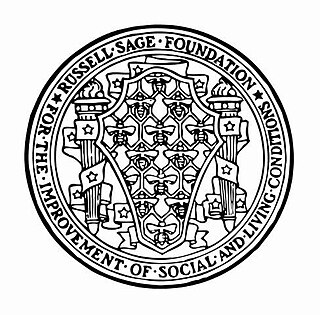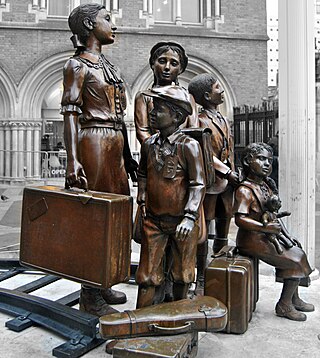Related Research Articles

Immigration to the United States has been a major source of population growth and cultural change throughout much of its history. In absolute numbers, the United States has by far the highest number of immigrants in the world, with 50,661,149 people as of 2019. This represents 19.1% of the 244 million international migrants worldwide, and 14.4% of the United States' population. In 2018, there were almost 90 million immigrants and U.S.-born children of immigrants in the United States, accounting for 28% of the overall U.S. population.

The United States had an official estimated resident population of 334,914,895 on July 1, 2023, according to the U.S. Census Bureau. This figure includes the 50 states and the District of Columbia but excludes the population of five unincorporated U.S. territories as well as several minor island possessions. The United States is the third most populous country in the world, and the most populous in the Americas and the Western Hemisphere. The Census Bureau showed a population increase of 0.4% for the twelve-month period ending in July 2022, below the world average annual rate of 0.9%. The total fertility rate in the United States estimated for 2022 is 1.665 children per woman, which is below the replacement fertility rate of approximately 2.1.

The Immigration Reform and Control Act was passed by the 99th United States Congress and signed into law by U.S. President Ronald Reagan on November 6, 1986.

The Russell Sage Foundation is an American non-profit organisation established by Margaret Olivia Sage in 1907 for “the improvement of social and living conditions in the United States.” It was named after her recently deceased husband, railroad executive Russell Sage. The foundation dedicates itself to strengthening the methods, data, and theoretical core of the social sciences in order to better understand societal problems and develop informed responses. It supports visiting scholars in residence and publishes books and a journal under its own imprint. It also funds researchers at other institutions and supports programs intended to develop new generations of social scientists. The foundation focuses on labor markets, immigration and ethnicity, and social inequality in the United States, as well as behavioral economics.

Immigration is the international movement of people to a destination country of which they are not usual residents or where they do not possess nationality in order to settle as permanent residents. Commuters, tourists, and other short-term stays in a destination country do not fall under the definition of immigration or migration; seasonal labour immigration is sometimes included, however.

Foreign nationals (aliens) can violate US immigration laws by entering the United States unlawfully or lawfully entering but then remaining after the expiration of their visas, parole, or temporary protected status. Illegal immigration has been a matter of intense debate in the United States since the 1980s.

The sociology of immigration involves the sociological analysis of immigration, particularly with respect to race and ethnicity, social structure, and political policy. Important concepts include assimilation, enculturation, marginalization, multiculturalism, postcolonialism, transnationalism and social cohesion.

Douglas Steven Massey is an American sociologist. Massey is currently a professor of Sociology at the Princeton School of Public and International Affairs at Princeton University and is an adjunct professor of Sociology at the University of Pennsylvania.

Emigration from Mexico is the movement of people from Mexico to other countries. The top destination by far is the United States, by a factor of over 150 to 1 compared to the second most popular destination, Canada.
Mary C. Waters is an American sociologist, demographer and author. She is the John L. Loeb Professor of Sociology and the PVK Professor of Arts and Sciences at Harvard University. Much of her work has focused on immigrants, the meaning of racial and ethnic identity, and how immigrants integrate into a new society. Waters chaired the 2015 National Research Council Panel on The Integration of Immigrants into American Society.
Steven James Gold is a sociologist involved in research on ethnic economies, international migration, the development of ethnic communities, visual sociology, and qualitative methods. Having served as President of the International Visual Sociology Association (1987–1990) and Chair of the American Sociological Association Section on International Migration (2003–2004), he is a professor at Michigan State University in the Department of Sociology
Rubén G. Rumbaut is a prominent Cuban-American sociologist and a leading expert on immigration and refugee resettlement in the United States. He is Distinguished Professor of Sociology at the University of California, Irvine.

Harriet B. Presser (1936–2012) was a sociologist and demographer. Having served on the faculty at the University of Maryland, College Park, for more than 30 years, at the time of her death she was a Distinguished University Professor. She was elected president of the Population Association of America for the year 1989. In addition, she was awarded the Jessie Bernard Award from the American Sociological Association in 2010, and was elected as a Fellow to the American Association for the Advancement of Science in 2002. As a scholar, she studied the intersection of gender, work and family, and pioneered the sociological specialization in that area. She was widely recognized for bringing a feminist perspective to the demographic study of such issues as fertility, child care, housework, and the effects of the global 24/7 service economy.
Richard D. Alba is an American sociologist, who was a Distinguished Professor at the Graduate Center, CUNY and at the Sociology Department at the University at Albany, SUNY, where he founded the University at Albany’s Center for Social and Demographic Analysis (CSDA). He is known for developing assimilation theory to fit the contemporary, multi-racial era of immigration, with studies in America, France and Germany. In 2020 he was elected to the National Academy of Sciences.
Rogelio Sáenz is currently Professor in the Department of Demography at the University of University of Texas at San Antonio and the Mark G. Yudof Endowed Chair at the University of Texas at San Antonio. Prior to joining UTSA, Sáenz was Professor of Sociology and former Department Head at the Department of Sociology at Texas A&M University.
Edward Telles is Distinguished Professor of Sociology at the University of California, Irvine and Director of the Center for Research on International Migration. He has authored several books and many articles, winning numerous prizes including the Distinguished Scholarly Publication Award from the American Sociological Association. He has been a leader in the study of race, color and ethnicity globally and throughout the Americas as well as on immigration and immigrant integration in the United States.
Catalina Amuedo-Dorantes is a Spanish economist, a Professor in the Economics and Business Management faculty at the University of California, Merced and a Professor and Department Chair at San Diego State University. Since 2015, she has been the Western Representative for a standing committee called the Committee for the Status of Women in the Economics Profession (CSWEP). Her field of work focuses on the fundamentals of labour economics and international migration, particularly the nature of immigration policies and its impact on migrant's assimilation into the community at a state and local level. Amuedo-Dorantes has published multiple articles in refereed journals including Journal of Public Economics, Journal of Population Economics, International Migration, and Journal of Development Economics.
Jorge Guillermo Durand Arp-Nisen is a research professor of anthropology at the University of Guadalajara and the Center for Economic Research and Teaching (CIDE). He is co-director with Douglas S. Massey on the Mexican Migration Project. and the Latin American Migration Project, sponsored by the universities of Princeton and Guadalajara. He is a member of the American Philosophical Society, National Academy of Sciences, and the American Academy of Arts and Sciences. In Mexico, he is a member of the National System of Researchers of the Mexican Academy of Sciences. Further, he has been granted the Guggenheim Fellowship for Social Sciences award in the Latin American & Caribbean Competition, as well as the Bronislaw Malinowski Award by the Society for Applied Anthropology.
Immigration to the United States has many effects on the culture and politics of the United States.
C. Matthew Snipp is an American sociologist and demographer. He is currently the Burnet C. and Mildred Finley Wohlford Professor of Humanities and Sciences at Stanford University. Snipp has made contributions to the field of race and ethnicity studies, particularly in understanding the social dynamics of racial and ethnic classification, and racial inequality.
References
- ↑ "UC Irvine - Faculty Profile System - Frank D. Bean". www.faculty.uci.edu.
- ↑ "Distinguished Career Award Winners for the Section on International Migration". Archived from the original on April 5, 2012. Retrieved August 2, 2011.
- ↑ "The Hispanic Population of the United States | Russell Sage Foundation". Archived from the original on September 28, 2011. Retrieved August 28, 2011.
- ↑ "Frank D Bean". research.urban.org. Archived from the original on July 12, 2011. Retrieved August 2, 2011.
- ↑ "U.S. Commission on Immigration Reform - Mexico-U.S. Binational Migration Study Report". Archived from the original on March 7, 2011. Retrieved August 2, 2011.
- ↑ Dillon, Sam (August 31, 1997). "U.S.-MEXICO STUDY SEES EXAGGERATION OF MIGRATION DATA". www.nytimes.com.
- ↑ "Choice Reviews Online". www.cro2.org. Retrieved February 24, 2024.
- ↑ "UCI School of Social Sciences". Archived from the original on August 5, 2012. Retrieved August 28, 2011.